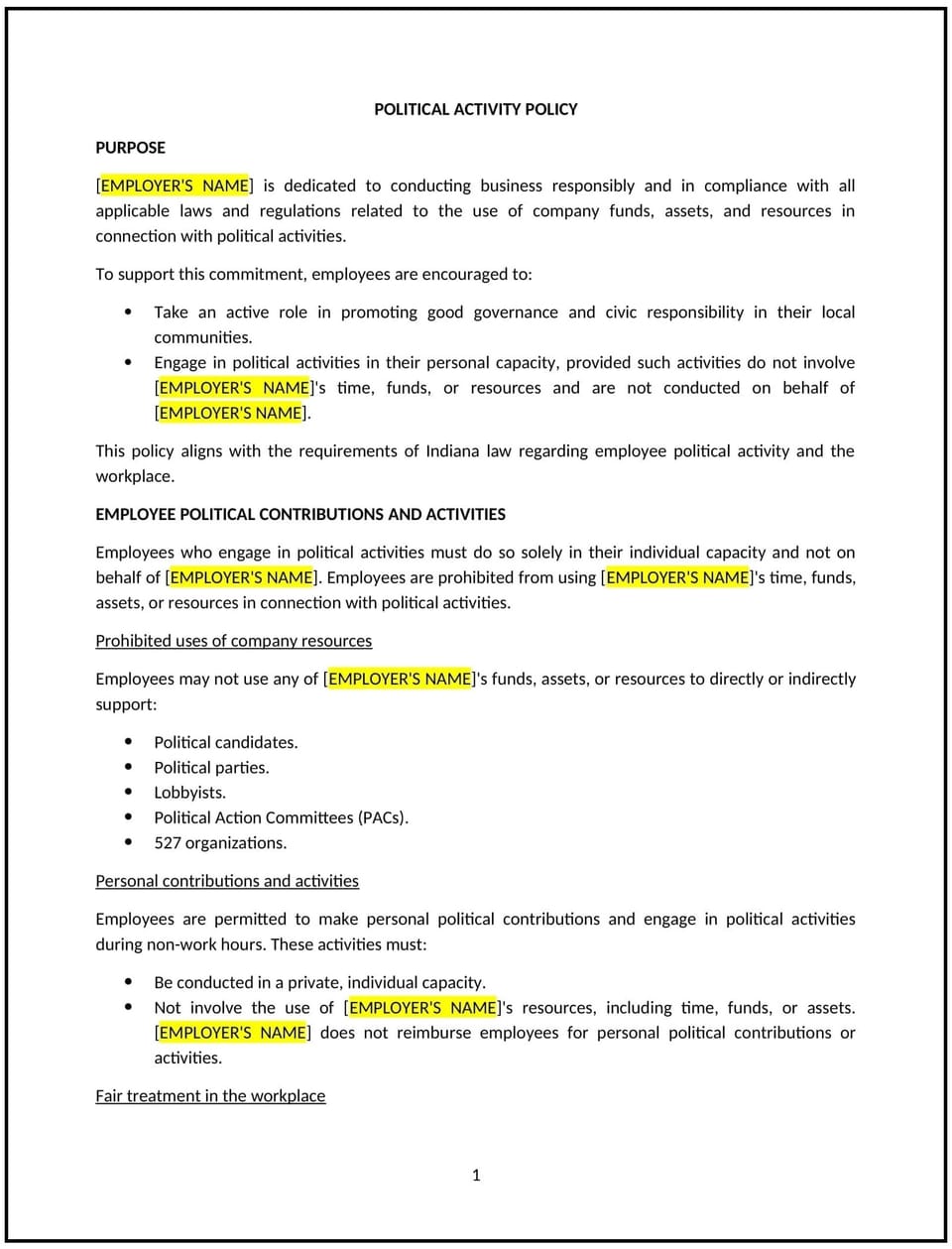Political activity policy (Indiana): Free template

Political activity policy (Indiana): Free template
This political activity policy helps Indiana businesses establish guidelines for employee participation in political activities while maintaining a respectful and inclusive workplace. It outlines acceptable behaviors, restrictions on political activity during work hours, and the company’s stance on political neutrality to avoid conflicts of interest and disruptions. This policy supports businesses in fostering a productive environment that respects employees’ rights and personal beliefs.
By implementing this policy, Indiana businesses can balance employee rights with workplace harmony and ensure a professional environment free from political bias or tension.
How to use this political activity policy (Indiana)
- Define the scope of political activities: Specify what constitutes political activity in the workplace, such as campaigning, distributing political materials, or soliciting donations. Include examples to clarify acceptable and unacceptable behavior.
- Set boundaries for work hours: Clearly state that political activities should not interfere with work responsibilities. Employees should refrain from engaging in political discussions or activities during work hours or while using company resources.
- Establish guidelines for company neutrality: Emphasize that the company does not endorse or oppose specific political views or candidates and that employees’ personal political opinions do not represent the company’s stance.
- Address use of company resources: Prohibit the use of company resources, such as email, office supplies, or meeting spaces, for political activities unless explicitly authorized.
- Encourage respectful communication: Promote respectful discussions on political topics to prevent workplace conflicts. Employees should be reminded to avoid discrimination, harassment, or any form of retaliation based on political beliefs.
- Outline disclosure requirements: Require employees to disclose any political activity that could create a conflict of interest, such as holding public office or working on a political campaign that may affect their job responsibilities.
- Provide for manager training: Train managers on how to address political activity in the workplace, ensuring they can enforce the policy consistently and handle sensitive situations professionally.
- Review and update regularly: Periodically review the policy to ensure it reflects changes in business practices or applicable Indiana laws.
Benefits of using this political activity policy (Indiana)
Implementing this policy provides several key benefits for Indiana businesses:
- Reduces workplace disruptions: Clear boundaries help minimize distractions or conflicts caused by political discussions or activities during work hours.
- Protects company reputation: Ensures employees’ political actions are distinct from the company’s operations, preventing reputational risks.
- Promotes inclusivity: Fosters a workplace environment that respects diverse political views without bias or favoritism.
- Supports compliance: Aligns with Indiana laws regarding employees’ rights and political activities while safeguarding the company’s interests.
- Encourages professionalism: Reinforces the importance of maintaining a focused and professional workplace free from unnecessary conflicts.
- Provides clear expectations: Ensures all employees understand the company’s stance and their responsibilities regarding political activities.
Tips for using this political activity policy (Indiana)
- Communicate the policy: Share the policy during onboarding and provide periodic reminders to ensure all employees understand the guidelines and expectations.
- Encourage open dialogue: Create a safe space for employees to discuss concerns or questions about political activity without fear of retaliation.
- Monitor workplace behavior: Ensure managers are observant of political discussions or activities that may disrupt the workplace or violate the policy.
- Avoid enforcing personal views: Train management to remain neutral when addressing political activity, focusing solely on policy compliance.
- Review legal obligations: Stay informed about Indiana laws protecting employees’ rights to political expression to ensure the policy remains compliant.
- Document incidents: If an issue arises related to political activity, document the situation thoroughly to support fair and consistent enforcement of the policy.
Q: Can employees discuss politics at work?
A: Employees may discuss politics during breaks or personal time, but political discussions should not disrupt work or create conflicts with coworkers.
Q: Are employees allowed to use company resources for political activities?
A: No, company resources such as email, office supplies, or meeting spaces should not be used for political activities unless explicitly authorized.
Q: What should employees do if they feel uncomfortable with political discussions?
A: Employees should report concerns to their manager or HR. The company encourages respectful communication and will address situations to maintain a professional environment.
Q: Can employees engage in political activity outside of work?
A: Yes, employees are free to participate in political activities on their personal time, as long as it does not create a conflict of interest with their job responsibilities.
Q: How should managers handle political conflicts between employees?
A: Managers should mediate disputes impartially and ensure all employees adhere to the policy, focusing on maintaining a respectful and inclusive workplace.
This article contains general legal information and does not contain legal advice. Cobrief is not a law firm or a substitute for an attorney or law firm. The law is complex and changes often. For legal advice, please ask a lawyer.


